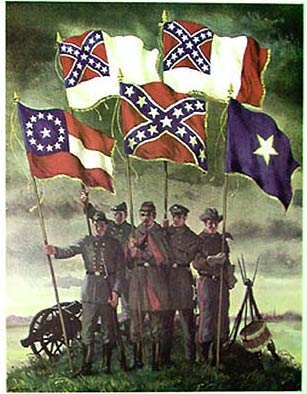A Confederate Victory: How the South Could Have Won the Civil War: Conclusion
Patrick Harris
-
When eleven states seceded from the Union to form the Confederacy, they chose Jefferson Davis of Mississippi as their President. Much of the decisions of the Confederate government would go through Davis. Like any man, Davis was not perfect, and he made several decisions, which, had they been made earlier, could have resulted in the South winning or prolonging the Civil War. The first of these decisions was Davis’ choice to delay a call for an all out guerrilla war until March 1865, when many Confederates had already lost hope, and the proclamation did not lead to many guerrilla uprisings (Davis, 2001, p. 529). This was not a new idea. Throughout the war “many Confederate civilian and military leaders sought an all out guerrilla war” (Sweeney, 2004, p. 4) though the most powerful would not see the value of this idea until it was too late to do much good. Davis had of course thought of guerrilla war before his call for it in 1865: "[Jefferson] Davis, from the beginning, insisted that victory alone could save the South, and he meant to achieve it, even if he had to disperse his armies and wage a guerrilla war" (Davis, 2001, p. 496). President Davis, though he often thought of using guerrilla war, did not act upon this until the very end of the war. Had he called for it sooner, every Union soldier in the Confederacy would live in fear of the Confederate guerrillas, supply lines would be constantly ambushed, and unfortunately civilians would be killed, taking away the Union will to fight, affecting the final outcome of the war, leading to stalemate or victory for the Confederacy. The second decision that Davis made that should have been made earlier to have affected the outcome of the civil war was the enlistment of black soldiers to fight for the Confederacy. In March 1865, the Confederate Congress enacted this resolution:
"The Congress of the Confederate States of America do enact, That, in order to provide additional forces to repel invasion, maintain the rightful possession of the Confederate States, secure their independence, and preserve their institutions, the President be, and he is hereby, authorized to ask for and accept from the owners of slaves, the services of such number of able-bodied negro men as he may deem expedient, for and during the war, to perform military service in whatever capacity he may direct". (Freedmen and Southern Society Project, 2012)
This act was a desperate measure, and it did nothing to aid the Confederate cause. It does however, bring up the historical question of whether or not this may have helped the Confederacy had it been done earlier. Again, the responsibility for the delay in this action lies at the feet of President Jefferson Davis. This idea had been proposed earlier in the war by Confederate General Patrick Cleburne. Davis had reservations about this idea, as it seemed to undermine the entire southern institution of slavery as “arming slaves was essentially a way of setting them free, since they could not realistically be sent back to plantations after they had fought” (history.com, 2013). Eventually, Davis called for black soldiers, though it was too late to affect the outcome of the war. Had Davis made this decision earlier, the large numbers of available black troops could be used to help bolster the Confederate Army’s dwindling ranks of whites, giving the Confederacy a more equal fight with the Union. The final responsibility for both of these late decisions lies with Davis. The enlistment of black soldiers and the call for guerrilla war in March 1865 were Davis’ last ditch efforts, and it is possible that had he agreed to the calls of his advisors earlier in the war, the civil war would have been won or prolonged for the South.
The Civil War was a series of decisions by the Confederacy. If many of these seemingly insignificant or difficult decisions had been made earlier or differently, the Civil War could have turned out very differently. If Special Order 191 had not been found before the Battle of Antietam, the South would have won that engagement, with ramifications for the entire war. The bombardment of Fort Sumter could have been rendered unnecessary had her commander surrendered like every other Union commander in the infant Confederacy. Finally, two key decisions by Jefferson Davis, the call for all out guerrilla war and the enlistment of black soldiers were postponed until after they may have been useful by an unsure Davis. All or one of these conditions may have prolonged, postponed or ultimately led to the South wining the Civil War. The Civil War was the bloodiest conflict in American history, though it was a victory for no one, only a loss for the South.
References
Charnick, Steve. (2013) Special Order 191: Perhaps the greatest “What If” of American History. Retrieved from http://antietam.aotw.org/exhibit.php?exhibit_id=428
Confedqerates Approving Black Soldiers (2013) Retrieved from: http://www.history.com/this-day- in-history/confederacy-approves-black-soldiers
Davis, William C. (2001) An Honourable Defeat. New York: Mariner
Freedmen & Southern Society Project. (2012) Confederate Law Authorizing the Enlistment of Black Soldiers, 1865, as promulgated in a military order [Web Archive of Confederate Congress Registrar]. Retrieved from http://www.freedmen.umd.edu/csenlist.htm
Graham, Martin F. (2011) A Pocket History of the Civil War. London, U.K.: Osprey Publishing
Sifakis, Stewart. (1988) Who Was Who in the Civil War. New York: InfoBase Publishing
Sweeney, Richard J. (2004) Evidence That Jefferson Davis Planned Guerrilla War. Washington D.C.: Georgetown University Publishing
Turtledove, Harry (1997) How Few Remain [Historical Note]. New York: Ballantine Books

